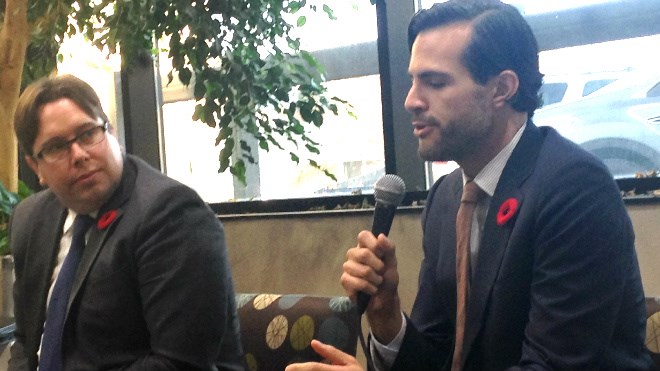The first sign the NDP in the were in trouble in the recent federal election took place in Sudbury, a Greater Sudbury of Commerce breakfast event heard Wednesday morning.
The comments came from Karl Baldauf, of the Ontario Chamber of Commerce, who said Canadians were hungry for a prime minister they could connect with after a decade of Stephen Harper.
When Sudbury MP Glenn Thibeault switched parties to the provincial Liberals late last year, everyone was wondering what he was thinking.
“What was he doing going down to provincial politics, leaving the NDP ranks, especially when they were excelling in the polls and there was so much confidence behind (NDP Leader) Tom Mulcair?” Baldauf said.
Thibeault realized that Mulcair wasn't someone he could work with and wasn't someone Canadians would elect prime minister, he said.
“So that canary in the coalmine started here in Sudbury,” Baldauf said. “Yes, Mulcair is very capable, very intelligent, but the emotional connection he lacked is one that Trudeau made up for in droves.”
As important as policy and other considerations are, personalities mean a lot in politics, he said, and Canadians were yearning for a leader other than Harper.
“People were done with the lack of connection they had with Harper,” Baldauf said. “And if that's the case, the next person you go to would not be someone like Mulcair, who perhaps had difficulty connecting with people on a personal level. It was Justin Trudeau.”
In addition to Baldauf, Wednesday's panel included Charles Cirtwell of the Northern Policy Institute and Hendrik Brakel, of the Canadian Chamber of Commerce. It was moderated by Patricia Mills, former publisher of Northern Ontario Business.
In her opening remarks, Mills congratulated new Liberal MPs Paul Lefebvre (Sudbury) and Marc Serré (Nickel Belt) on their wins.
“Unfortunately, they couldn't be here today,” she quipped. “They had a pressing engagement. But I would like to hear the story when they get back.”
Brakel noted the timing for the breakfast was perfect, taking place just as Trudeau and his cabinet was being sworn in. With such a tight race, he said no one was predicting a majority, especially since the
Conservatives, NDP and Liberals were tied in the polls at the end of September.
What happened was a surge of support for the Liberals. The Tories actually got the same number of votes in 2015 as they did in 2011, while the NDP lost about a million votes. What changed was three million votes the Liberals got from people who didn't turn out last time around.
“We've never seen anything like this – their vote shot up from 2.7 million to 6.8 million,” he said. “An additional 4.1 million voters. Where did they come from?”
The result showed the strong desire of centre-left voters to oust Harper. So was it “Trudeaumania or Harperphobia?” that was the bigger factor? He asked.
“I'm not convinced it was Trudeaumania,” Brakel said. “I've never seen Canadians so angry ...There was a tremendous desire for change in Canada.”
Cirtwell agreed, saying young people were especially eager for a change in government. The Liberals went from no seats in Northern Ontario to holding seven of the 10 seats in the region after Oct. 19. The reason?
“I think it's pretty clear it was Harperphobia,” he said. “Young people in this country were annoyed with Harper long before Trudeau even became leader of his party.
“And the anybody-but-Conservative vote decided about a week before the election that it wasn't going to be the NDP, they were going to coalesce around the Liberals.”
While the Grits scored best when the Institute evaluated party platforms based on 32 policy recommendations “that are good for the North,” their grade was still pretty low.
“The best grade on that assessment was a C – the Liberals got it,” he said.
They got an F in some key areas – they didn't talk about FedNor, the Ring of Fire, infrastructure for small- and medium-sized cities.
“All of these things are issues that are important to us,” Cirtwell said.
But they scored well on their commitment to making progress in relations with First Nations government, which is a huge issue in the North.
“What's good for First Nations and aboriginal communities is good for the North,” he said. “Period, full stop.”
Join Sudbury.com+
- Messages
- Post a Listing
- Your Listings
- Your Profile
- Your Subscriptions
- Your Likes
- Your Business
- Support Local News
- Payment History
Sudbury.com+ members
Already a +member?
Not a +member?
Sign up for a Sudbury.com+ account for instant access to upcoming contests, local offers, auctions and so much more.
